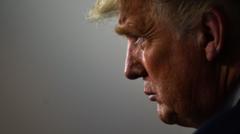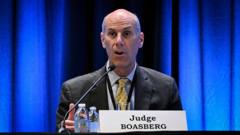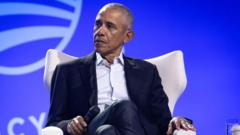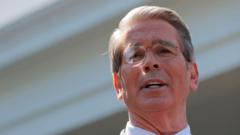With a mandate from voters, Trump's second term raises questions about his influence and the potential for significant alteration to American politics.
Trump's Second Act: A New Era or Growing Turmoil?

Trump's Second Act: A New Era or Growing Turmoil?
As Donald Trump is set for a controversial inauguration, America braces for his promised sweeping changes.
In a historic first, Donald Trump will begin a new presidential term indoors at the US Capitol, where the typical inauguration ceremony has been moved due to freezing temperatures. Hopeful for major transformations, Trump’s second act in the White House starts Monday with an ambitious agenda, one he claims will be put into action immediately. At a packed rally the day before, he teased a barrage of executive orders that would tackle core issues like immigration, the environment, and transgender rights.
Trump, 78, returns to the presidency armed with voter support after a decisive victory, eyeing the potential for dramatic policy shifts. Nonetheless, apprehensions linger among critics who fear authoritarian tendencies, spurred by his predecessors' warnings of emerging oligarchs surrounding him. As Trump embarks on this journey, he recognizes the need for tangible deliverables and intends to ensure his administration's dynamic execution.
This time, a seasoned and loyal team is backing him to implement his objectives, and he aims to root out what he describes as a "deep state" within government ranks. Trump’s plan emphasizes swift firings of federal officials, hinting at a fiercely partisan administrative environment. While some of his initiatives are reliant on Congressional action, the Republican majority is likely to back him, bolstered by strategic pressure from influential allies in the corporate tech sector.
However, the logistics and finances regarding mass deportations and targeted political reprisals remain daunting. Democratic opposition may struggle to mount an effective response as internal fractures linger following the November elections. The Democratic Party is seemingly still processing their recent defeat, and early resistance activities have fizzled compared to past mobilizations.
Upon his return, Trump enjoys access to an unprecedented alliance with some of the world's wealthiest figures, like Elon Musk, Jeff Bezos, and Mark Zuckerberg, who are set to attend the inauguration. Their financial support could play a pivotal role as he seeks to reclaim his political influence. Some tech giants have also adjusted their stances on moderating content related to Trump, indicating a shift in the landscape that he is eager to leverage.
To capture the attention of his base, Trump is expected to sign eye-catching executive actions on day one, which may include pardons for those involved in the Capitol riots, enhancing his appeal among supporters. Yet, there’s caution around the broader implications of his policies, such as potential labor shortages in critical sectors stemming from mass deportations and tax cuts favoring the wealthy, raising questions about who genuinely benefits.
Amidst this swirl of promises and actions, Trump's flair for entertainment serves as a key component of his political brand. His administration promises to be both dramatic and transformative, with effects that potentially resonate globally, altering the American narrative in profound and lasting ways.
Trump, 78, returns to the presidency armed with voter support after a decisive victory, eyeing the potential for dramatic policy shifts. Nonetheless, apprehensions linger among critics who fear authoritarian tendencies, spurred by his predecessors' warnings of emerging oligarchs surrounding him. As Trump embarks on this journey, he recognizes the need for tangible deliverables and intends to ensure his administration's dynamic execution.
This time, a seasoned and loyal team is backing him to implement his objectives, and he aims to root out what he describes as a "deep state" within government ranks. Trump’s plan emphasizes swift firings of federal officials, hinting at a fiercely partisan administrative environment. While some of his initiatives are reliant on Congressional action, the Republican majority is likely to back him, bolstered by strategic pressure from influential allies in the corporate tech sector.
However, the logistics and finances regarding mass deportations and targeted political reprisals remain daunting. Democratic opposition may struggle to mount an effective response as internal fractures linger following the November elections. The Democratic Party is seemingly still processing their recent defeat, and early resistance activities have fizzled compared to past mobilizations.
Upon his return, Trump enjoys access to an unprecedented alliance with some of the world's wealthiest figures, like Elon Musk, Jeff Bezos, and Mark Zuckerberg, who are set to attend the inauguration. Their financial support could play a pivotal role as he seeks to reclaim his political influence. Some tech giants have also adjusted their stances on moderating content related to Trump, indicating a shift in the landscape that he is eager to leverage.
To capture the attention of his base, Trump is expected to sign eye-catching executive actions on day one, which may include pardons for those involved in the Capitol riots, enhancing his appeal among supporters. Yet, there’s caution around the broader implications of his policies, such as potential labor shortages in critical sectors stemming from mass deportations and tax cuts favoring the wealthy, raising questions about who genuinely benefits.
Amidst this swirl of promises and actions, Trump's flair for entertainment serves as a key component of his political brand. His administration promises to be both dramatic and transformative, with effects that potentially resonate globally, altering the American narrative in profound and lasting ways.




















